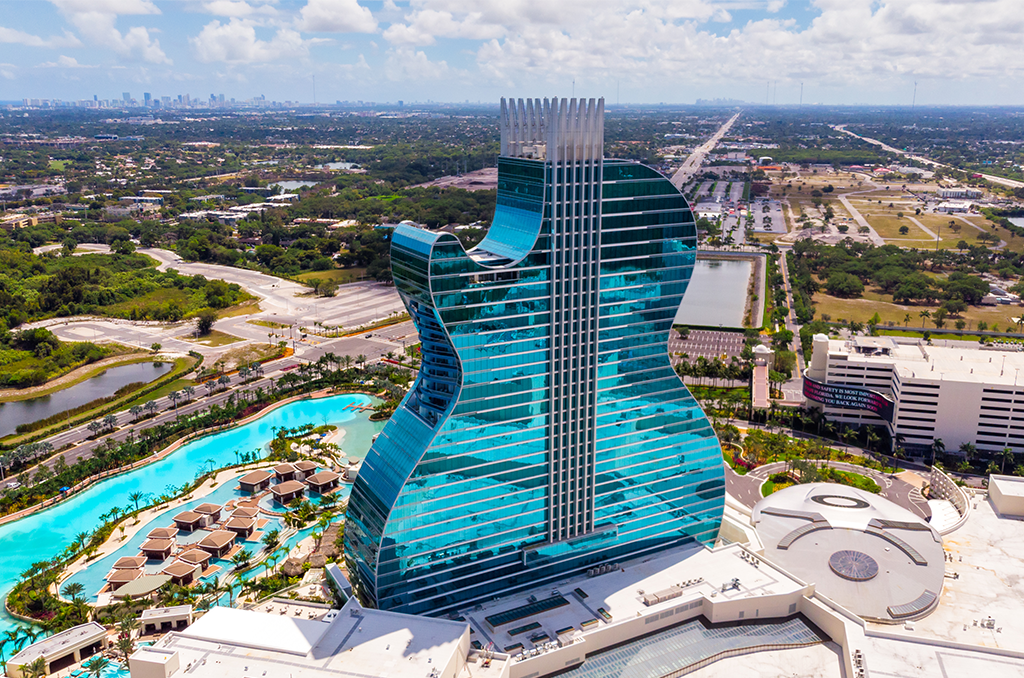Aerial View on New Hard Rock Casino – Courtesy: Shutterstock – Image by YES Market Media
TALLAHASSEE, Fla. – Declaring a “legal fiction,” two pari-mutuel facilities have filed a federal lawsuit challenging a newly approved plan that allows the Seminole Tribe to operate sports betting in Florida.
The lawsuit was filed on Friday by owners of Magic City Casino in Miami-Dade County and Bonita Springs Poker Room in Southwest Florida. The suit states that federal laws are violated within the sports-betting plan passed by lawmakers back in May. Lawmakers supported the plan as part of a “gambling compact” negotiated by Governor Ron DeSantis and tribal leaders.
Under this deal, the Seminole tribe would serve as the hub for sports betting, which has been illegal in Florida in the past. Gamblers throughout the state would be able to place bets online, with the bets run through computer servers on tribal property.
However, the nearly 70-page lawsuit states that a law known as the federal Indian Gaming Regulatory Act does not allow bets to be placed from tribal lands. In addition, the suit argues that the entire basis of the plan is an attempt to bypass a 2018 state constitutional amendment which requires voter approval of gambling expansions.
“In an effort to circumvent this clear prohibition in the state Constitution, the 2021 compact and implementing law provide that a person sitting on her poolside lounge chair or his couch at home placing a sports bet through the tribe is ‘deemed’ not to be placing a bet that is otherwise illegal in the state,” the lawsuit said. “The 2021 compact unlawfully deems the bet to be placed on the tribe’s reservation, where the servers will be located. However, this is nothing more than a legal fiction belied by the fact that sports betting is still taking place outside the tribe’s reservations in a state where sports betting remains illegal.”
Sports betting was the highest-profile part of the deal that tribal leaders and DeSantis made in April. The compact includes the tribe paying $2.5 billion to Florida over the first five years in exchange for control over online sports betting. The tribe will also receive other benefits such as the ability to offer roulette and craps at its casinos.
The sports-betting part of the deal still needs approval from the U.S. Department of the Interior. This department oversees tribal gaming. In May, lawmakers recognized that they expected legal challenges.
“Obviously, having this kind of agreement, you’re navigating kind of the icebergs of legal hurdles,” House Speaker Chris Sprowls, R-Palm Harbor, told reporters in May.
Sprowls stated that he questions whether a legal challenge would be triumphant.
“You know, reasonable people disagree. Some people have looked at it and said, ‘Hey, I don’t think it’s gonna make it.’ I’ve looked at it. I think it will. The reality is that’s going to be resolved by a court,” he added.
The CEO of Seminole Gaming, Jim Allen, acknowledged that he expected to face legal challenges in an interview last month. However, he spoke about how this plan would benefit the state.
“Our problem is that if you look at the illegal sports betting in online gaming sites, there is billions of dollars that’s occurring on an annual basis already from the citizens of the state of Florida,” Allen said in the interview. “So part of our message to the leadership of the state was it’s happening anyway. It’s not regulated. Many, many times these sites are just a magnet for offshore activity that may or may not include money laundering and many other illegal activities. So why not offer the product, because clearly the citizens have told us they want it.”
Beneath this plan, the Seminole tribe would contract with pari-mutuel facilities to assist market sports betting. According to the lawsuit, this would include offering kiosks at pari-mutuel facilities for placing bets.
Despite that, the lawsuit filed by the Buchanan Ingersoll & Rooney firm argues that pari-mutuals would be put at a disadvantage if the plan goes through. It stated, “pari-mutuels that are unable to, or choose not to, enter into a marketing agreement with the tribe are completely shut out of any opportunity to offer sports betting.”
“Accordingly, the pari-mutuels will not only lose the walk-in traffic on which their business models are based, which will ultimately affect their revenue from slot machines, card rooms, and pari-mutuel wagering, as well as the ancillary entertainment and dining options offered to patrons of their facilities — but they are also being denied the opportunity to compete on a level playing field with the tribe,” said the lawsuit.
The Bonita Springs and Magic City facilities are run by the Havenick family, who have been involved in the state’s pari-mutuel industry for a very long time. The lawsuit also declares that the sports betting plan violates federal laws such as the Unlawful Internet Gaming Enforcement Act and the Wire Act of 1961.
Stories that matter are our priority. At Florida Insider, we make sure that the information we provide our readers is accurate, easy-to-read, and informative. Whether you are interested in business, education, government, history, sports, real estate, nature or travel: we have something for everyone. Follow along for the best stories in the Sunshine State.
Melissa’s career in writing started more than 20 years ago. Today, she lives in South Florida with her husband and two boys.

